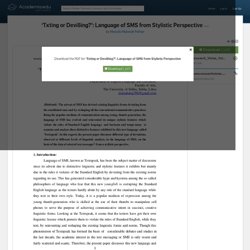

Google Books corpora. How to Use English Punctuation Correctly: 7 steps. Steps Part 1 Using Proper Capitalization 1Always start a sentence with a capital letter.

How has technological advancements changed the english language. This is an article I've had bookmarked for a while that actually contains a lot of information against your thesis: I often quote parts of it when refuting some ridiculous claim like "texting is destroying the English language".

If anything, I think technology has had a greater impact on other languages than it has on English. Virtually every language spoken in any developed nation has absorbed quite a few English loanwords relating to technology, internet, and other phenomena that have accompanied the beginning of the digital age. Similarly, if you were to visit an internet chatroom in, for example, Portuguese, you'll find that many speakers substitute English words relating to technology for words that already exist in Portuguese. For instance, there's an awkward Brazilian word for "chat": bate-papo. However, I see the English word "chat" used more often than not. ‘Txting or Devi8ing?’: Language of SMS from Stylistic Perspective. Www.researchvistas.com Vol.1.

Issue 03 May-June, 2012 3.2. Orthographic Features: Orthography of a language refers to the writing system of a particular language and includes factors such as distinctive use of alphabets, capital letters, spelling, punctuation, and ways of expressing emphasis (italic, boldface, etc). 3.3. Phonological features refer to the sound system of a particular language and include factors such as the distinctive use of vowels, consonants, intonation, stress etc. 3.4. Syntactic features imply structure and syntax and include factors such as distinctive use of sentence structure, word-order etc.
Lon's Article Directory » How the Net and Mobile Phones Changed Language. How the Internet Changed Writing in the 2000s. In a famous passage from “Ulysses,” James Joyce recapitulates the development of the English language in 45 pages — from the archaic and formal (“Deshil Holles Eamus”) to the conversationally casual (“Pflaap!

Pflaap! Blaze on”). Over the past decade, as more people have spent more time writing on the Internet, that same evolution has not only continued, it feels like it’s accelerated. With so much discussion about how the Internet is changing journalism and media, there’s surprisingly little said about how writing itself has transformed. But it has changed in a dramatic if subtle way. digg Nine years ago, I remember being one of 100 or so journalists gathered to listen to a veteran writer speak.
Opinions on the Social and Cultural Impact of English as an International Language. By David McLachlan Jeffrey Introduction This paper examines a range of opinions within the debate on the social and cultural impact of English as an international language (EIL), including the personal opinions of the writer.

The social and cultural impact of EIL is a wide field encompassing many often-conflicting issues, especially with regard to whether it has been advantageous or disadvantageous to former colonies, and whether this continues to be the case at present with unprecedented globalization. As it will not be possible to do full justice to the wide scope of this subject in the short space of this paper, the approach will be an attempt to draw from the varied perspectives of an assortment of theorists, and to limit the focus primarily to two formerly non-English speaking countries, and the .
Finally (in Section 4), the main conclusions reached in the paper are drawn together and highlighted, together with their implications for the English language teaching (ELT) profession. Blogs - College of Journalism - To boldly go with usage rather than the rules of grammar. How to Understand the Deep Structures of Language. There are two striking features of language that any scientific theory of this quintessentially human behavior must account for.

The first is that we do not all speak the same language. This would be a shocking observation were not so commonplace. Communication systems and other animals tend to be universal, with any animal of the species able to communicate with any other. Likewise, many other fundamental human attributes show much less variation. Barring genetic or environmental mishap, we all have two eyes, one mouth, and four limbs.
The second striking feature of language is that when you consider the space of possible languages, most languages are clustered in a few tiny bands. Your slumps affect your language learning more than your flows. Let’s talk a little bit about cycling.

As anyone who has ever cared about average speed knows, uphill stretches affect your average speed much more negatively than downhill stretches affect it positively. In other words, even though one might look at a track and think that a hill cancels itself out, this isn’t the case. In fact, the best kind of track is one with no height differences at all (provided we start and finish at the same altitude, of course). Learning Chinese is much like cycling in this regard. There are people who go on binges and study like maniacs for short periods of time (downhill cycling), but then run out of steam and have slump lasting considerably longer (uphill cycling).
Slumps, uphill cycling and procrastination We all have slumps. However, the main difference between many students I know and myself is that my low output is still considerably higher than zero.